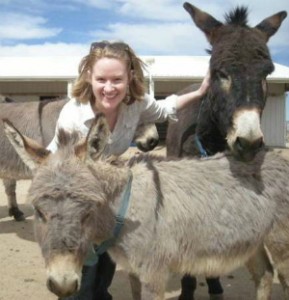How Writing and Gardening Overlaps
“In the spring, at the end of the day, you should smell like dirt.”
-Margaret Atwood
 This spring, when the first grape hyacinths were pushing their way through the snow, I made a decision to abandon something I love for something I love even more.
This spring, when the first grape hyacinths were pushing their way through the snow, I made a decision to abandon something I love for something I love even more.
Although I grew up in a family of avid gardeners, I never took to the dirt like my ancestors. Three years ago though, I began to suspect I was missing out on one of life’s deep mysteries by refusing to learn how to grow things. On a whim, I applied for a small, 4×6 plot in the community garden down the block from my apartment.
That first year was nothing short of miraculous. The dirt seemed to give and give: rainbow chard, summer squash, green onions, rosemary, broccoli, red Russian kale. Every morning, the sharp scent of dirt coming to life beneath the shower of water brought me intense joy. Nurturing plants to maturation awakened in me a renewed faith in the goodness of life.
When it came time this spring to renew the lease on my little plot, I immediately said yes and began planning my next cornucopia. But life, ever-changing, switched course.
Shortly after renewing my plot, I sat at my desk drafting a blog post for my newly launched website devoted to writing. The project had rapidly taken the reins of my life, and for the first time in over a year, I was writing on a regular basis. I was alive again. In order to continue the great rush of inspiration sweeping through my world, I knew I needed to honor my work by placing writing at the center of my life.
I thought of my sweet little garden, lying in wait beneath the snow, and my heart sank. It would be impossible for me to keep up with both writing and growing this year. I would have to choose.
As a writer, I know that inspiration is limitless. Despite this abundance, I also understand that my capacity for putting ideas into action is bound by the realities of time and the fullness of my own energy. I cannot say yes to everything.
I drafted an email to the garden leader, informing her of my decision to let go of my plot, hit the send button, and sat at my desk and cried.
To my surprise, a gorgeous transformation occurred that day.
A woman living a block away from me accepted the vacant space and soon knocked on my door to reimburse my garden fee. She, I learned, was also a writer and had recently quit her job to write full-time.
“This plot is very generous, especially to writers,”I said, assuring her. “You simply cannot fail.”
I offered her my leftover vegetable seeds and wished her luck, knowing she would not need it.
 Now, days when I am home working, I see my writer friend walking to and from the garden, carrying bags of produce just as heavy as those I used to bring back to my kitchen. She often shares with me her bounty and tells me how good the garden has been to her. I know this feeling well, and I am grateful for her prosperity.
Now, days when I am home working, I see my writer friend walking to and from the garden, carrying bags of produce just as heavy as those I used to bring back to my kitchen. She often shares with me her bounty and tells me how good the garden has been to her. I know this feeling well, and I am grateful for her prosperity.
In the absence of my vegetable bed, I have learned that writing and gardening are not so dissimilar. With each, the final moment is coaxed from a point of maximum potential. Kale plants contain the inspiration of their completion in their tiny seed bodies, just as books hold the germ of their birth in the placement of a single word. Growth, maturation, and harvest are the shared cycle of all living things.
Yet gardening is different from the joy of word-play. Tending a garden is so much simpler. On those days when I feel inadequate as a gardener, the plants take over. They forgive my ignorance. In truth, they know more than I do about what it means to become a vegetable. There is deep beauty in allowing a thing to become itself.
I have learned that I can also let my writing grow in this way, but I need the patience and faith of the gardener to trust that, in time, my work will reach full bloom. The season of a book, or an essay, or a collection of poetry is not necessarily equinox to equinox. Writing has its own rhythm.
Margaret Atwood’s admonishment that we smell of dirt at the end of a spring day is wise advice from a wise gardener and a deeply insightful writer. I would add this bit if encouragement, learned from my summers with the vegetables: if writing pulls you from the soil, don’t fret too much about the shift in elements. The earth, like writing, will call you back in time.
Until then, write, and trust that all those little seeds will be there, ready to send out shoots, when the time has finally come to water them.
—
Norah Charles is a writer, writing teacher, and literary coach. She encourages others to write their hearts out through her classes, ebooks, blog, and literary events. Norah’s approach to writing is simple, joyful, inspiring, and transformative. Explore her world of writing at www.norahcharles.com.
Category: Contemporary Women Writers, On Writing

























Wonderful article, Norah! I just fell in love with these words: “The earth, like writing, will call you back in time.” It sounds so magical!
Thanks so much for your kind words, Nora! It was such a lovely surprise to read your comment.
Norah, you know how they say “there’s a time for every season under heaven.” We have a dear friend whose late husband had had a garden, and after he passed away suddenly, she confessed that she couldn’t bear to lok out her kitchen window and not see a garden… she asked me to help. So several times a week my three little ones and I went to her home and we women worked while the children “helped.” We tilled, planted everything we liked, did some weeding, etc. Well, I do not have a green thumb, nor does she, but we had an overwhelming harvest: huge eggplants, rich red tomatoes, beans, even corn…. It was wonderful and we thought that somehow her husband was watching. We did this for a few years, then my friend told me, it’s time to stop the gardening. We’re busy and now we have all those memories. So I wish you well… yes, sometimes we have to choose. I applaud your courageous decision! Thank you for a most inspiring essay. Mary Latela
Thank you for sharing this beautiful story, Mary. What a gift for you, your friend, and your children to work hand-in-hand with the earth to create such meaningful memories. As spring comes around again here, I am inspired to plant a few seeds as a reminder of the power of dirt to heal so many sorrows. Thanks for posting this inspiring response.
Thank you for your truly inspiring words! From a fellow gardener and writer, I thank you!!
Thanks for reading, Carrie!
That’s a decision I’d hate to make although in my case, I have to make time for it otherwise the garden would soon become a jungle!
There are so many things about gardening that I should apply to other areas of my life but don’t, patience being the biggest by far! If things don’t work out this year then I graciously accept that there’s always next year. When it takes a few years for things to mature I accept that without question. If only I could apply that to real life. Watching the seasons is a wonderful thing, winter is a little dull admittedly but there’s the anticipation of spring and the excitement of seeing those first shoots. Once you get to summer there’s the sense of achievement from seeing your hard work in full bloom, knowing that you did this all by yourself. By autumn it’s sad that it’s coming to an end but there’s contentment in having seen the completion of a life cycle.
The great thing about gardening is that it’s a wonderful stress reducer. As a non thinking activity, you can hammer out the minutiae of plots and characters in a pressure free environment.
Yes, the pressure-free environment of a garden is a superb place to work out plot kinks and delve into unexplored territory in my writing. I love the quiet demands the plants place on my patience as well. One day soon, I will have a jungle again!
Thanks for reading, Lara.
A gracious narrative about this magical relationship. Cicero stated (and I paraphrase), all one needs is a library and a garden. It is also important to see the beauty as the garden decomposes is fall, and lies fallow in winter. Writers need to honor these “seasons” in their lives also. This bears rich fruit if one can trust the natural cycle. Thank you for such inspiring words, Norah!
Thank you for sharing here, Tina. I love your reminder to honor the “seasons” in our writing lives.
As another writer/gardener, I loved your post. There’s so much overlap between the process of growing plants and creative writing and love exploring the connections on my blog:
http://annegoodwin.weebly.com/annecdotal/category/nature%20gardeninga81ce96c02
Will check out yours now.
Hi Anne! Thank you for the comment. I am following you on Twitter now and love your website. If only I had enough time in the day to garden as much as I write, I would probably be able to feed myself instead of being a “starving writer.”
Let’s start a program in which we teach writers to grow their own food so they can become independent of Big Farming AND the terrors of “publish or perish!” I heard Barbara Bos is very skilled at growing courgettes…